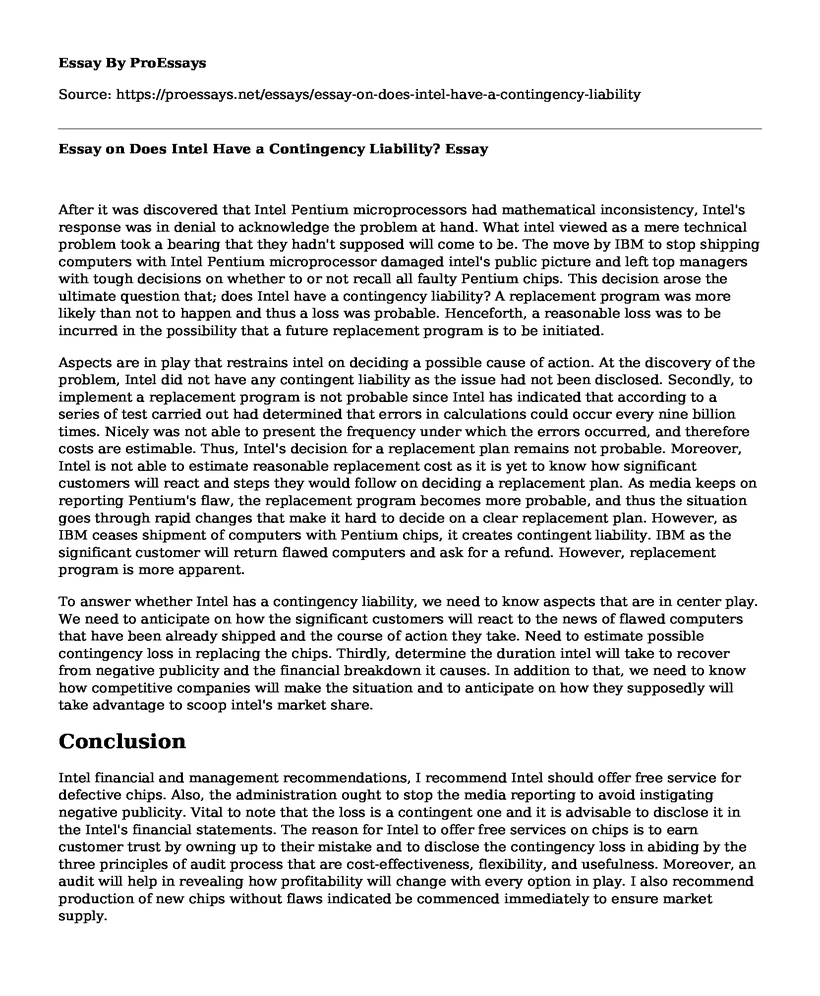After it was discovered that Intel Pentium microprocessors had mathematical inconsistency, Intel's response was in denial to acknowledge the problem at hand. What intel viewed as a mere technical problem took a bearing that they hadn't supposed will come to be. The move by IBM to stop shipping computers with Intel Pentium microprocessor damaged intel's public picture and left top managers with tough decisions on whether to or not recall all faulty Pentium chips. This decision arose the ultimate question that; does Intel have a contingency liability? A replacement program was more likely than not to happen and thus a loss was probable. Henceforth, a reasonable loss was to be incurred in the possibility that a future replacement program is to be initiated.
Aspects are in play that restrains intel on deciding a possible cause of action. At the discovery of the problem, Intel did not have any contingent liability as the issue had not been disclosed. Secondly, to implement a replacement program is not probable since Intel has indicated that according to a series of test carried out had determined that errors in calculations could occur every nine billion times. Nicely was not able to present the frequency under which the errors occurred, and therefore costs are estimable. Thus, Intel's decision for a replacement plan remains not probable. Moreover, Intel is not able to estimate reasonable replacement cost as it is yet to know how significant customers will react and steps they would follow on deciding a replacement plan. As media keeps on reporting Pentium's flaw, the replacement program becomes more probable, and thus the situation goes through rapid changes that make it hard to decide on a clear replacement plan. However, as IBM ceases shipment of computers with Pentium chips, it creates contingent liability. IBM as the significant customer will return flawed computers and ask for a refund. However, replacement program is more apparent.
To answer whether Intel has a contingency liability, we need to know aspects that are in center play. We need to anticipate on how the significant customers will react to the news of flawed computers that have been already shipped and the course of action they take. Need to estimate possible contingency loss in replacing the chips. Thirdly, determine the duration intel will take to recover from negative publicity and the financial breakdown it causes. In addition to that, we need to know how competitive companies will make the situation and to anticipate on how they supposedly will take advantage to scoop intel's market share.
Conclusion
Intel financial and management recommendations, I recommend Intel should offer free service for defective chips. Also, the administration ought to stop the media reporting to avoid instigating negative publicity. Vital to note that the loss is a contingent one and it is advisable to disclose it in the Intel's financial statements. The reason for Intel to offer free services on chips is to earn customer trust by owning up to their mistake and to disclose the contingency loss in abiding by the three principles of audit process that are cost-effectiveness, flexibility, and usefulness. Moreover, an audit will help in revealing how profitability will change with every option in play. I also recommend production of new chips without flaws indicated be commenced immediately to ensure market supply.
Cite this page
Essay on Does Intel Have a Contingency Liability?. (2022, May 26). Retrieved from https://proessays.net/essays/essay-on-does-intel-have-a-contingency-liability
If you are the original author of this essay and no longer wish to have it published on the ProEssays website, please click below to request its removal:
- Google Leadership
- Organization's Mission, Vision, and Values Essay
- Essay on Knowledge Management in Educational Leadership
- VA MISSION Act of 2018 Paper Example
- Healthcare Leadership in Terms of Quality and Safety Activities Essay Example
- Essay Example on Mentorship: Unlocking Your Potential Through Knowledge Sharing
- Free Essay Example on Collaborative Project Design: Teamwork and Learning Outcomes







